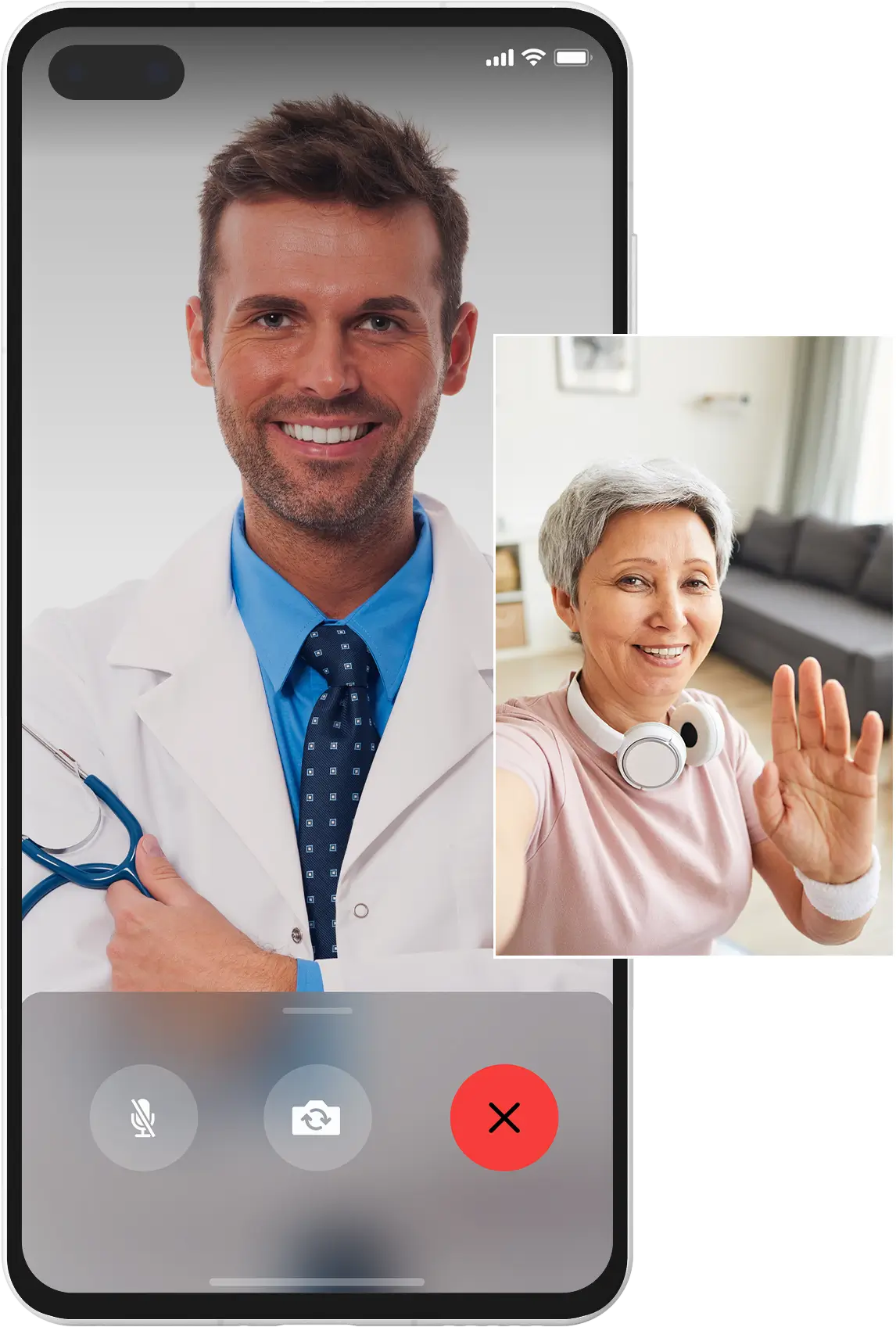Table of Contents
Join Now and Get Your First Consultation Free!
Secure your health with a yearly membership for just €29.90. Sign up today and enjoy peace of mind with expert care at your fingertips!
Get Started
Itchy, Irritated, and Unsure?
Candida vaginosis, also known as vaginal yeast infection, is a common condition affecting millions of women globally. This detailed article explores what causes it, how to identify its symptoms, and the most effective treatments available today—including those provided by online healthcare platforms like Doctors365.org. From understanding the science behind the infection to exploring lifestyle changes, natural remedies, and prevention tips, this guide is your complete resource. Whether you’re experiencing symptoms for the first time or dealing with recurring infections, discover how Doctors365 offers secure, convenient telemedicine services tailored to your needs—all from the comfort of home.
1. Understanding Candida Vaginosis
1.1 What is Candida Vaginosis?
Candida vaginosis, more accurately termed vulvovaginal candidiasis, is a common fungal infection caused by the overgrowth of Candida species, predominantly Candida albicans. This yeast naturally resides in the vaginal flora but can proliferate excessively under certain conditions, leading to infection.
1.2 How it Differs from Bacterial Vaginosis and UTIs
It’s crucial to distinguish candida vaginosis from other vaginal infections:
- Bacterial Vaginosis (BV): Caused by an imbalance in vaginal bacteria, leading to a fishy-smelling discharge.
- Urinary Tract Infections (UTIs): Infections in the urinary system, presenting with burning during urination and frequent urges.
Understanding these differences ensures appropriate treatment and management.
1.3 Causes and Triggers
Several factors can disrupt the natural balance of vaginal flora, promoting Candida overgrowth:
- Antibiotic Use: Eliminates beneficial bacteria that control yeast growth.
- Hormonal Changes: Pregnancy, menstruation, or hormonal contraceptives can alter vaginal pH.
- Uncontrolled Diabetes: High sugar levels can foster yeast proliferation.
- Weakened Immune System: Conditions like HIV/AIDS or medications like corticosteroids can reduce the body’s defense against infections.
2. Common Symptoms
2.1 Physical Signs to Watch For
Recognizing the symptoms of candida vaginosis is essential:
- Itching and Irritation: Intense itching in the vaginal and vulvar areas.
- Discharge: Thick, white, cottage cheese-like discharge without a strong odor.
- Redness and Swelling: Inflammation of the vulva.
- Pain: Discomfort during intercourse or urination.
2.2 Emotional and Psychological Impact
Beyond physical discomfort, recurrent infections can lead to:
- Anxiety and Stress: Concerns about sexual health and relationships.
- Self-esteem Issues: Embarrassment or frustration due to persistent symptoms.
3. Who is at Risk?
3.1 Risk Factors
Certain individuals are more susceptible to candida vaginosis:
- Pregnant Women: Hormonal shifts can disrupt vaginal flora.
- Diabetics: Elevated blood sugar levels can encourage yeast growth.
- Antibiotic Users: Broad-spectrum antibiotics can kill beneficial bacteria.
- Immunocompromised Individuals: Reduced immunity can hinder the body’s ability to control yeast
3.2 Is it Contagious?
Candida vaginosis is not classified as a sexually transmitted infection (STI). However, sexual activity can introduce new bacteria, potentially disrupting vaginal balance. It’s rare but possible for partners to transmit yeast infections to each other.
4. Diagnosis of Candida Vaginosis
4.1 Clinical Methods
Healthcare providers diagnose candida vaginosis through:
- Medical History: Discussing symptoms and medical background.
- Physical Examination: Inspecting the vaginal area for signs of infection.
- Laboratory Tests: Microscopic examination of vaginal discharge or cultures to identify yeast presence.
4.2 What to Expect in a Consultation
During a consultation, expect:
- Symptom Discussion: Detailing the nature, duration, and severity of symptoms.
- Examination: A pelvic exam to assess signs of infection.
- Testing: Swabs may be taken for laboratory analysis.
4.3 Can It Be Diagnosed Online?
Yes, platforms like Doctors365.org facilitate online consultations where:
- Symptom Assessment: Patients describe symptoms via video or chat.
- Medical History Review: Discussing past infections and treatments.
- Guidance: Doctors may recommend over-the-counter treatments or prescribe antifungal medications.
5. Candida Vaginosis and Women’s Health
5.1 Impact on Fertility
While candida vaginosis doesn’t directly cause infertility, recurrent infections can:
- Affect Vaginal Environment: Alterations may impact sperm mobility.
- Cause Discomfort: Pain during intercourse can hinder conception efforts.
5.2 Recurrence and Chronic Issues
Some women experience recurrent infections, defined as four or more episodes in a year. Factors contributing to recurrence include:
- Incomplete Treatment: Not completing prescribed medication courses.
- Underlying Conditions: Uncontrolled diabetes or hormonal imbalances.
- Lifestyle Factors: Diets high in sugar or tight-fitting clothing.
6. Effective Treatment Options
6.1 Antifungal Medications
Treatment typically involves:
- Topical Antifungals: Creams or suppositories applied directly to the affected area.
- Oral Antifungals: Pills like fluconazole for systemic treatment.
6.2 Natural Remedies – What Works?
Some individuals explore natural remedies:
- Probiotics: Aiming to restore healthy vaginal flora.
- Yogurt Applications: Introducing beneficial bacteria.
However, it’s essential to consult a healthcare provider before trying alternative treatments.
6.3 What to Avoid
To prevent exacerbating symptoms:
- Avoid Douching: It can disrupt natural vaginal balance.
- Limit Sugar Intake: High sugar diets can promote yeast growth.
- Wear Breathable Fabrics: Opt for cotton underwear to reduce moisture.
7. Diet and Lifestyle Changes
7.1 How Sugar Affects Candida
High sugar consumption can:
- Fuel Yeast Growth: Providing an energy source for Candida.
- Disrupt Blood Sugar Levels: Especially in diabetics, leading to increased infection risk.
7.2 Best Foods to Eat
Incorporate:
- Low-Sugar Foods: Vegetables, lean proteins, and whole grains.
- Probiotic-Rich Foods: Yogurt, kefir, and fermented foods to support healthy flora.
7.3 Exercise, Sleep, and Hygiene
Maintaining overall health aids in prevention:
- Regular Exercise: Boosts immune function.
- Adequate Sleep: Essential for immune system maintenance.
- Proper Hygiene: Keeping the vaginal area clean and dry.
8. The Role of Online Doctors
8.1 How Online Consultations Work
Online platforms like Doctors365.org offer:
- Virtual Appointments: Video, audio, or chat consultations.
- Flexible Scheduling: Access to doctors 24/7.
- Prescription Services: Electronic prescriptions sent to your pharmacy.
8.2 Why Many Prefer Virtual Visits
Benefits include:
- Convenience: No need to travel or wait in clinics.
- Privacy: Discuss sensitive issues from the comfort of home.
- Accessibility: Ideal for those in remote areas or with mobility issues.
8.3 Benefits of Using Doctors365.or
Doctors365.org stands out by providing:
- Multilingual Support: Services in over 11 languages.
- Extensive Network: Access to over 600 specialists across 28 medical fields.
- Affordable Options: Second opinions starting at €9.90.
- Secure Platform: Ensuring patient confidentiality and data protection.
9. When to See a Doctor Online
9.1 Signs You Shouldn’t Ignore
Seek medical advice if experiencing:
- Persistent Symptoms: Discomfort lasting more than a few days.
- Recurrent Infections: Multiple episodes within a year.
- Unusual Discharge: Changes in color, consistency, or odor.
9.2 Emergency vs. Non-Emergency Situations
While online consultations are suitable for many scenarios, immediate in-person care is necessary if:
- Severe Pain: Intense abdominal or pelvic pain.
- High Fever: Indicating a possible systemic infection.
- Pregnancy Complications: Any concerning symptoms during pregnancy.
10. Privacy and Comfort in Telemedicine
10.1 Breaking the Taboo
Discussing vaginal health can be uncomfortable. Telemedicine offers:
- Anonymity: Reduced embarrassment when discussing sensitive topics.
- Comfort: Consultations from your chosen environment.
10.2 Confidentiality and Data Security
Doctors365.org prioritizes:
- Data Protection: Secure encryption of medical records.
- Patient Privacy: Only the consulted doctor accesses your information.
11. Recurring Candida Infections
11.1 What Causes Recurrence
Factors include:
- Incomplete Treatment: Not following through with prescribed regimens.
- Underlying Health Issues: Diabetes or hormonal imbalances.
- Lifestyle Habits: Diet and hygiene practices.
11.2 Managing Long-Term Infections
Strategies involves:
- Medical Evaluation: Identifying and addressing underlying causes.
- Maintenance Therapy: Regular antifungal treatments as prescribed.
- Lifestyle Adjustments: Diet, clothing choices, and hygiene.
12. Candida in Special Populations
12.1 Pregnant Women
Pregnancy increases susceptibility due to hormonal changes. Treatment typically involves:
- Topical Antifungals: Safe options during pregnancy.
- Medical Supervision: Regular check-ups to monitor progress.
12.2 Diabetics and Immunocompromised Individuals
These groups may experience more severe infections. Management includes:
- Strict Blood Sugar Control: Essential for diabetics.
- Medical Oversight: Regular consultations to monitor and adjust treatment.
13. Candida vs. Other Vaginal Conditions
13.1 Quick Comparisons
13.2 Misdiagnosis: A Common Problem
Symptoms can overlap, leading to misdiagnosis. Accurate diagnosis is vital for effective treatment, emphasizing the importance of consulting healthcare professionals.
14. FAQs Answered by Online Doctors
14.1 What Patients Ask Most
- Can I treat candida vaginosis at home?
Over-the-counter treatments are available.
- Can I treat candida vaginosis at home?
Over-the-counter treatments are available and often effective for mild cases. However, if it’s your first infection or you’re unsure if it’s candida, it’s best to consult a doctor online via Doctors365.org to avoid misdiagnosis. - How long does it take for symptoms to go away?
Symptoms typically improve within 1 to 3 days of starting treatment, but the full course should be completed even if you feel better to avoid recurrence. - Is it safe to have sex while being treated for candida vaginosis?
It’s recommended to avoid vaginal intercourse during treatment as it may irritate the area further or spread the infection. - Can men get candida infections from a partner?
Yes, although it’s less common. Men can develop irritation or itching on the penis if exposed, especially if they are uncircumcised or immunocompromised. - Does Doctors365 provide prescriptions for antifungal medication?
Absolutely! With Doctors365.org, licensed doctors can evaluate your symptoms online and provide prescriptions digitally, sent directly to your preferred pharmacy.
15. Prevention Tips for Candida Vaginosis
15.1 Everyday Practices
Preventing candida vaginosis starts with simple daily habits:
- Maintain good genital hygiene using mild, unscented soaps.
- Change out of wet clothing promptly, especially after swimming or exercise.
- Avoid tight-fitting clothes like synthetic underwear or pantyhose for long durations.
- Do not douche, as it disrupts natural vaginal flora.
15.2 Probiotics and pH Balance
Maintaining a healthy vaginal environment is key:
- Consume probiotics such as yogurt, kefir, or supplements to support healthy bacteria.
- Use pH-balanced feminine products, especially during menstruation.
- Manage blood sugar levels if diabetic, as high glucose encourages yeast growth.
Want expert guidance tailored to you? Talk to a healthcare professional instantly through Doctors365.org.
16. Conclusion and Next Steps
Candida vaginosis is more than just an uncomfortable inconvenience—it affects physical, emotional, and sexual well-being. Whether you’re dealing with your first episode or struggling with recurrent infections, you deserve support that is fast, discreet, and reliable.
Doctors365.org brings medical expertise to your fingertips. With multilingual, 24/7 access to licensed doctors, secure consultations, and prescriptions without leaving your home, it’s never been easier to take control of your vaginal health.
Don’t wait or guess—get the answers you need, when you need them.
Visit Doctors365.org today to speak with a professional and feel like yourself again.
17. FAQs (Quick Answers)
1. Is candida vaginosis the same as a yeast infection?
Yes, it’s often referred to as a vaginal yeast infection caused by Candida overgrowth.
2. Can I use Doctors365.org if I live outside the EU?
Yes! Doctors365 offers global support in over 11 languages and provides expert advice wherever you are.
3. Is telemedicine safe for intimate health issues?
Absolutely. Platforms like Doctors365 use secure, encrypted technology to ensure your privacy and data security.
4. How soon can I get an appointment on Doctors365?
In most cases, you can speak to a doctor within minutes. The service is available 24/7.
5. Can I use insurance with Doctors365?
Some plans are accepted, but the platform is designed to be affordable even without insurance, with transparent prices starting from €9.90.
Written by Diellza Rabushaj, Medical Writer & Researcher.
Recommended articles for You

Why headaches worsen in Ramadan—and practical steps that help.

New trial data suggests coffee may be safer—and possibly helpful—for some people with AF.

Evidence-based guide to vitamin C in pain management and postoperative recovery.


